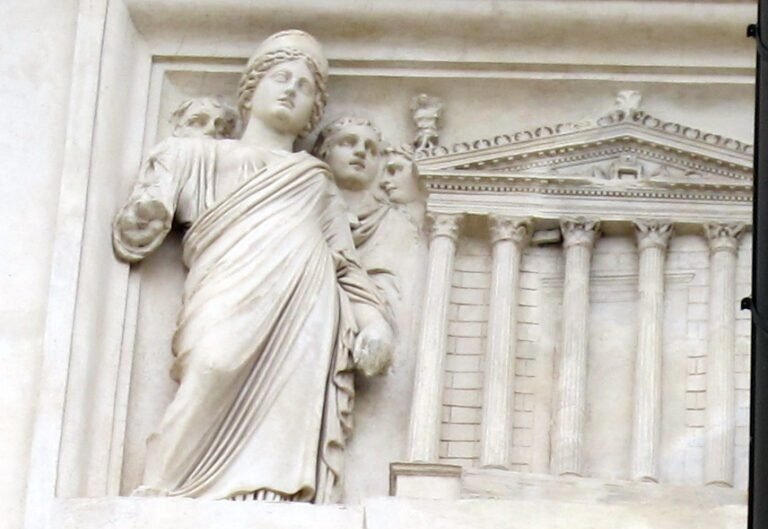Contenus
ToggleIn short
Megalesia, Megalensia or Megalenses Ludi, was a festival celebrated in ancient Rome from April 4 to 10, in honor of Cybele, known to the Romans as Magna Mater (Great Mother). The name of the festival derives from Greek Megale (μϵγάλη), meaning “Great”. Ludi were games or entertainment associated with religious festivals.

Megalesia, games for the Great Mother
The image cult of Cybele was brought to Rome from Pessinus in 204 BC, with the Gallae priestesses of the goddess. As the “Great Mother of the Gods” and purported goddess Trojan ancestral to Rome's ruling patrician caste, she was recruited to act on Rome's behalf in the war against Carthage.
His arrival was celebrated with a magnificent procession, sacred festivals (lectisternia), games and offerings at the Temple of Victory on Palatine Hill, where his image was temporarily housed. In 203, Cybele was promised a temple of her own. Games in his honor were celebrated in 193. The regular annual celebration of Megalesia began in 191, with the completion and dedication of the temple by Marcus Junius Brutus.
Megalesia began on April 4, the anniversary of Cybele's arrival in Rome. The structure of the festival is unclear, but it included ludi scaenici (plays and other entertainment based on religious themes), probably performed on the deeply tiered approach to its temple; some of the plays were commissioned from well-known playwrights. On April 10, his image was taken in a public procession to the Circus Maximus and chariot races were held there in his honor.
The racecourse was visible from the threshold of its temple, and a statue of the Magna Mater was permanently installed on the dividing fence of the racecourse, showing the goddess seated on the back of a lion: the goddess could thus witness to the festivities organized in his honor.
Roman passers-by seem to have perceived Megalesia as typically "Greek"; or Phrygian. At the dawn of Rome's transition to the Empire, the Greek Dionysius of Halicarnassus described this procession as a wild Phrygian "mumery" and a "fabulous clap-trap", in contrast to the Megalesian sacrifices and games performed in what he admires as a dignified traditional Roman manner; Dionysius also applauds the wisdom of Roman religious law, which prohibited the participation of any Roman citizen in the procession and mysteries of the goddess; Slaves are forbidden to witness any of this.
At the end of the Republican era, Lucretius vividly describes the armed “war dancers” of the procession in their helmets with three plumes, clashing their shields, bronze on bronze, “enchanted by blood”; Galli in yellow robes, with long, perfumed hair waving their knives, a wild music of roaring tympanons and shrill flutes. Along the route, rose petals are scattered and clouds of incense arise.
The image of the goddess, wearing the wall crown and seated in a carved chariot pulled by a lion, is carried high on a bier. The Roman display of the Cybele Megalesia procession as an exotic and privileged public spectacle offers a stark contrast to what is known of the private and socially inclusive Phrygian-Greek mysteries on which it was based.
During the festival, wealthy Roman nobles took turns hosting each other in honor of the goddess; they were lavish, expensive, and competitive occasions in which the wealthy sought to impress their inferiors and peers; or in the latter case, to surpass them in extravagance. In direct response to this, the senate issued a decree in 161 BC, limiting the expenditure of meat, wine, and silverware for such feasts.
At the end of the Republican era, Cicero attacked his political opponent Clodius for sacrilegious disruption of the casti, sollemnes, religiosi (pure, traditional, religious) rites of Megalesia. Clodius had sought popular support by changing from a patrician to a plebeian gens. Megalesia was a primarily patrician affair; and in an apparent attempt to undermine patrician privilege, Clodius had hired gangs of slaves to forcibly take control of the festival. The attempt was a failure and Clodius was prosecuted for this and other outrages against the traditional and social proprieties of Rome.
Social networks
On this day and for a week, the Romans celebrated the Megalesia in honor of a Phrygian goddess Cybele. Meals and extravagance were customary as well as stage games on the Palatine Hill. #mythology #myth #legend #calendar #4April #rome #megalesia
Picture
